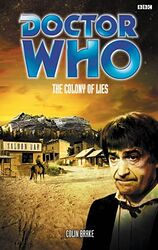
 |  |  |

 | Reviews for The Colony of Lies |
|
 |  |  |
There are 2 reviews so far. To add a review of your own for this item, visit the voting page.
| By: | The Admiral, Perth, Australia |
|
| Date: | Wednesday 23 February 2005 |
|
| Rating: |    8 8 |
To answer the main question: yes, it is a very good book and not a waste of your time.
Now to expand and give away some spoilers. The book is suppose a Dr. Who western but since the story doesn't take place in the wild west of the 1800's, rather a colony in the future that restricted technology, it doesn't succeed as a western. To me, that was a good thing because the science fiction aspects are thought provoking and delightful.
You might also put the book down as false advertising since the back of the book claims to have the 7th Doctor but you only meet him in the introduction. Give it time. He is in the book and does have a larger role than you realise. I particularly recommend the scene where he does meet the 2nd Doctor. Quite unexpected and enjoyable.
The book does feel rushed as you get to the last quarter. It's as if Colin Brake wanted to get all his ideas in and forced them. He could've used one more draft to pace the book better.
Overall, a very good book with some surprises and little items that add to the enjoyment (such as King William 10 Euro notes and
| By: | David Layton, Los Angeles, United States |
|
| Date: | Friday 28 December 2012 |
|
| Rating: |    7 7 |
Though the book has a setting in a quasi-western town on another world, and one character speaks in a somewhat western-like manner, it really is not a western at all. Brake may have been attempting something like a western, with a frontier town, a displaced earlier settlement (i.e. the Injuns) and something like the cavalry in the Earth Federation troops. However, the novel is more straightforward science fiction than anything else. The story and type are of the back to basics (pun intended, for those who read the book) late 1970s style, the reaction against the literary flights of fancy of the 1960s and early 1970s. It has the manner of John Varley or the early George R.R. Martin to it, maybe even Orson Scott Card.
The story involves a failing human colony on an Earth-like planet. The colony had been established on a theory that humanity had lost its way in too much technology, so that a return to the 19th-century style of living would give people a fresh start. However, the founder of the colony died when the colony ship crashed. Now, a century later, the colony is split into the Loyalists, wanting to keep the old ways, and the Realists who want more technology. Complications come when Earth Federation forces arrive to establish the basis for relocating refugees of the Dalek wars to this planet. The Federation ship sets off an alarm and the prior inhabitants begin to stir. Several interesting plot complications ensue, and Brake does manage to keep some surprises well hidden while at the same time logical when they arrive.
The book does not have much in the way of original ideas, but instead takes some well-known elements and combines them in a novel way. There are a few bits to quibble about. How can Jamie hold his own in a one-on-one fight with the biggest and toughest alien dog when repeatedly these dogs have shown the strength to rip apart doors and fling humans as if they were pillows? Does Zoe have to be on the brink of death three times? Why is the colonists' difficulties in getting pregnant not explained? Why is it that Federation official Greene is made out to be something other than human, but is really just another slimy political hack? Of course, the major problem for most readers will be the wholly unnecessary fan-wank of having a seventh Doctor cameo.
To wrap up, despite a few gaffs the book is a brisk read with science fiction elements put to good use.


